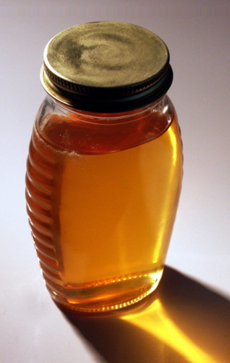Glossary Of Natural & Artificial Non-Caloric Sweeteners
Page 2: Natural (Nutritive) Sweeteners
This is Page 2 of an 11-page article. Click on the red links below to visit other pages. This glossary is protected by copyright and cannot be reproduced in whole or part. You are welcome to link to it.
|
|

Honey is a natural, nutritive, sweetener. Photo by Michael S. Richter | MorgueFile.com. Tea photo courtesy SXC.
|
|
Natural (Nutritive) Sweeteners
Nutritive sweeteners include sucrose (table sugar, or granulated sugar, which is made largely from sugar cane or sugar beet, and to a small extent from sorghum and sugar maples), honey, syrups (a large group including barley malt syrup, brown rice syrup, cane syrup, corn syrup, golden syrup, maple syrup, molasses, and sugar beet syrup), and sugar alcohols. Agave is a succulent plant that grows in Mexico; its sap, which tastes a bit like honey, is 90% naturally-occurring fructose that is a low-glycemic alternative for people on a low-glycemic diet.
All nutritive sweeteners, regardless of type, are broken down by the body into simple sugars to be used for energy. The body doesn’t know the difference between granulated sugar, high fructose corn syrup or honey: all will ultimately be broken down to the same simple sugars.
Sweeteners vary in consistency, color, and intensity of sweetness. The type of sweetener added to a food product depends on the best match for the purpose. Granulated sugar and brown sugar are better for cooking and baking, while high fructose corn syrup is more cost-effective in commercial food product applications like soft drinks.
|
|

|
|
The following are commonly added caloric sweeteners that can be found on product labels:
These sugars vary widely in their flavor, degree of sweetness and glycemic value. Agave, fructose and some honeys, e.g., are lower glycemic sugars and can be tolerated by some diabetics (plus, honey is sweeter than sugar so less is needed). If you’d like to find a more “beneficial” form of sugar for regular use, consult your healthcare professional.
Continue To Page 3: Dietary Supplements
Go To The Article Index Above
|

